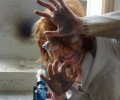Laughing as other people go head over heels has always been popular: just look at slapstick. This is why You've Been Framed was so popular. We might not like to admit it, but we laugh.
Laughter theory suggests that what we laugh at is incongruity within a play frame, i.e. non-serious loss of grace and dignity - a caper.
The one person who doesn't find it funny is the person being laughed at. But this could have dangerous implications for them - philosopher Henri Bergson argues that we laugh at mistakes to maintain the rules of society and put a halt to any outrageous behaviour. And it does work: the mocked becomes embarrassed and endeavours not to repeat the mistake. But it's not just laughter which stigmatises mistakes: it's common throughout our society. On his TED talk, Sir Ken Robinson argues that schools are killing creativity by "running education systems where mistakes are the worst things you can make". And this is fundamentally silly, since we're educating our children for a future we cannot imagine. Robinson argues that "creativity is as important in education as literacy and we should treat it with the same status".
Whilst I do intend to prepare for motherhood by investing in 50 Dangerous Things (You Should Let Your Children Do), I'm somewhat confused as to how one would fit "creativity" onto the syllabus. Maybe we would have academic chemistry lessons, followed by creative chemistry lessons, where dangerous chemicals are presented to the children and they are asked to design an experiment, write a risk assessment, then try it.
Like Neville's exploding cauldron scene in Harry Potter.
Personally, I think it's the school's job to encourage creative, not teach it. Then again, Robinson also thinks that schools are training everyone to be academics. And this really doesn't add up. Research is creative. Chemistry especially is a creative subject. And when you're doing research, you're wrong pretty much all the time. Things go bang. Reactions don't work. Expensive beam time is wasted.
The OED says of research: the systematic investigation into and study of materials and sources in order to establish facts and reach new conclusions
Or, better, Einstein: "If we knew what we were doing, it would not be called research, would it?"
It's not just that these are pleasant excuses for further lack of productivity, it's that creativity and making mistakes are absolutely crucial. As a climber I am using to falling. We fall on purpose. We fall to make sure we can take falls, to make sure we can catch them. If you never fall, you never push yourself to your limits and you can't improve. Falling is normal.
Chemistry is exactly the same. If you want something original, you want to understand things, you have to go beyond what you know will work. If education trains you out of creativity, academia recalls it just as you're getting rusty. And maybe if we'd had a creative education we would make fewer cracks and bangs during doctoral programmes as we had made our mistakes early in life.
But that'd be no fun, would it?
